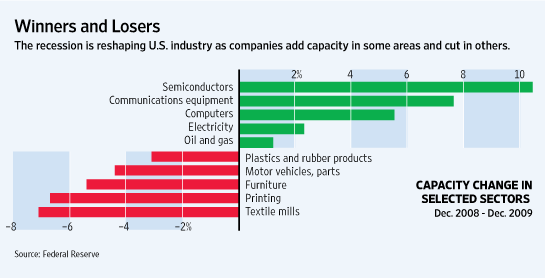The Future of Manufacturing in the U.S.
Hoping that old jobs return is a doomed project; we must look ahead to new modes of production and creating value. Frequent contributor Michael Goodfellow responded to The Wal-Mart Model of Self-Destruction: Lowest Prices, Always (January 24, 2010) with this story on the future of small-scale manufacturing: In the Next Industrial Revolution, Atoms Are the New Bits (Wired.com) . His point was that to bemoan the loss of old large-scale manufacturing jobs was not productive compared to forward-looking models such as the "workbench" production and crowd-sourcing/out-sourcing described in the Wired article. What I find radically appealing is not so much the technical aspects of desktop/workbench production of parts which were once out of financial reach of small entrepreneurs--though that revolution is the enabling technology--it is the possibility that entrepreneurs can own the means of production without resorting to vulture/bank investors/loans. Anyone who has been involved in a tech startup knows the drill--in years past, a tech startup required millions of dollars to develop a new product or the IP (intellectual property). To raise the capital required, the entrepreneurs had to sell their souls (and company) to venture capital (vulture capital) "investors" who simply took ORPM (other rich people's money) and put it to work, taking much of the value of new promising companies in trade for their scarce and costly capital. The only alternative were banks, who generally shunned "speculative investments" (unless they were in the billions and related to derivatives, heh). So entrepreneurs came up with the ideas and did all the hard work, and then vulture capital swooped in to rake off the profits, all the while crying bitter tears about the great risks they were taking with other rich people's spare cash. Now that these production tools are within reach of small entrepreneurs, the vulture capital machine will find less entrepreneural fodder to exploit. The entrepreneurs themselves can own/rent the means of production. That is a fine old Marxist phrase for the tools and plant which create value and wealth. Own that and you create your own wealth. In the post-industrial economies of the West and Asia, distribution channels acted as means of wealth creation as well: you want to make money selling books or music, for instance, well, you had to sell your product to the owners of the distribution channels: the record labels, film distributors, book publishers and retail cartels, all of whom sold product through reviews and adverts in the mainstream media (another cartel). The barriers to entry were incredibly high. It took individuals of immense wealth (Spielberg, et al.) to create a new film studio from scratch (DreamWorks) a few years ago. Now any artist can sell their music/books via the Web, completely bypassing the gatekeepers and distribution channels. In a great irony, publishers and labels are now turning to the Web to sell their product. If all they have is the Web, then what value can they add? I fully expect filmakers to go directly to the audience via the Web in coming years and bypass the entire film distribution cartel entirely. Why go to Wal-Mart to buy a DVD when you can download hundreds of new films off the Web? Both the supply chain and distribution cartels are being blown apart by the Web.Not only can entrepreneurs own/rent the means of production and arrange their own supply/assembly chains, they can also own their own distribution channels. The large-scale factory/distribution model is simply no longer needed for many products. As the barriers to owning the means of production and distribution fall, a Renaissance in small-scale production and wealth creation becomes not just possible but inevitable. Of course some manufacturing entails large scale production: aircraft, bulldozers, semiconductors, etc. Surprisingly, perhaps, some large-scale manufacturing is growing in the U.S.: Radical Shifts Take Hold in U.S. Manufacturing (WSJ.com) Here is a chart from the article: Protecting intellectual property is a powerful reason to bring high-level manuafcturing back home. It is simply fact that intellectual property is at risk overseas in countries with poor IP protection and rule of law. So is it worth risking your crown jewels to expand overseas? That is at least one issue facing Google in China. Anecdotally, it is known that the Japanese are careful to keep high-level manufacturing technology in Japan to protect it from theft or reverse engineering. The chart reflects this: there isn't much IP in furniture, textiles or plastic products to reverse engineer/steal, so these industries will continue declining unless they move to a small, flexible, low-cost model as described in the Wired article. Those industries which need to protect their IP or which cannot be made overseas (electricity) continue to expand. Opportunities abound on both large and small scales. DailyJava.net is now open for aggregating our collective intelligence. Of Two Minds is now available via Kindle: Of Two Minds blog-Kindle
If you haven't visited the forum, here's a place to start. Click on the link below and then select "new posts." You'll get to see what other oftwominds.com readers and contributors are discussing/sharing.
Order Survival+: Structuring Prosperity for Yourself and the Nation and/or Survival+ The Primer from your local bookseller or from amazon.com or in ebook and Kindle formats.A 20% discount is available from the publisher.Thank you, Kimberly S. ($50), for your extraordinarily generous contribution to this site. I am greatly honored by your support and readership. Thank you, Bill S. ($50), for your exceedingly generous contribution to this site. I am greatly honored by your support and readership.



























